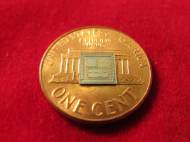A small chip embeds seven devices which enable navigation without GPS
 Global Positioning System (GPS) provides location and time information in as long as there is a clear line of sight from the measured position to four or more GPS satellites. While some places such as tunnels, some bridges, garages or canyons disallow GPS to function properly, interference or malfunction of GPS satellites could prove disastrous for military for which it was initially developed.
Global Positioning System (GPS) provides location and time information in as long as there is a clear line of sight from the measured position to four or more GPS satellites. While some places such as tunnels, some bridges, garages or canyons disallow GPS to function properly, interference or malfunction of GPS satellites could prove disastrous for military for which it was initially developed.
While some teams develop ways to use autonomous robotic planes to map uncharted areas during flight by using a laser rangefinder and inertial sensors, and others rely on ad hoc approach to explore unknown space, DARPA researchers at the University of Michigan developed a small integrated system which aids in navigation of known areas when GPS data is denied.
They created a small version of a Timing and Inertial Measurement Unit (TIMU) that contains everything needed to aid navigation when GPS is temporarily unavailable. The single chip TIMU prototype contains a six axis IMU (three gyroscopes and three accelerometers) and integrates a highly-accurate master clock into a single miniature system which is smaller than the size of a penny.
This chip integrates technology, design and materials and designs from DARPA’s Micro-Technology for Positioning, Navigation and Timing (Micro-PNT) program whose goal is to develop technology for self-contained, chip-scale inertial navigation and precision guidance.
The design is accomplished through new fabrication processes in high-quality materials for multi-layered, packaged inertial sensors and a timing unit, all in a tiny 10 cubic millimeter package. Each of the six microfabricated layers of the TIMU is only 50 microns thick, approximately the thickness of a human hair.
These components ensure that TIMU has precise information about orientation, acceleration and time needed for precise navigation between two known points.
“Both the structural layer of the sensors and the integrated package are made of silica”, said Andrei Shkel, DARPA program manager. “The hardness and the high-performance material properties of silica make it the material of choice for integrating all of these devices into a miniature package. The resulting TIMU is small enough and should be robust enough for applications (when GPS is unavailable or limited for a short period of time) such as personnel tracking, handheld navigation, small diameter munitions and small airborne platforms.”
The impressive system has a couple of downsides such as the fact the exact position without updates could lead to wrong navigation. Once combined with other systems, it could enable far better navigation as well as autonomous vehicles that are able to ride in charted places without access to GPS.









Leave your response!